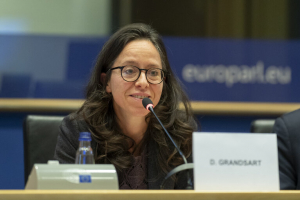On November 18. 2024, the TRAN Committee of the European Parliament held a public hearing on passenger rights, gathering experts and stakeholders to discuss two legislative proposals introduced within the European Commission’s Passenger Mobility Package last year, aiming to strengthen passenger rights through better enforcement and introducing protection specifically tailored to multimodal journeys.
Representing EPF, Senior Researcher Delphine Grandsart participated in the panel “Innovative solutions for multimodal passengers’ rights”, alongside other experts including Christina Russe (ECTAA), Gabriele Dona (Trenitalia), Raluca Marian (IRU), Alex Rennie (Skyscanner) and Jean-Philippe Monod de Froideville (Expedia Group). During the panel debate, Delphine outlined EPF’s perspective and crucial next steps for ensuring better passenger protection.
In her presentation, Delphine emphasised the importance of extending core passenger rights to multimodal journeys. The new proposal is welcome as a first step in the right direction, but unfortunately, its current scope is limited to:
- only combinations of transport services covered by existing Passenger Rights’ Regulations;
- only multi-modal combinations – not multi-operator (e.g., rail-rail, bus-bus);
- only single tickets – i.e., purchased in one go AND explicitly advertised as a ‘single contract’.
Notably, for so-called ‘combined’ multimodal tickets – i.e., purchased in a single payment by the passenger, but not presented as a ‘single contract’ – better protection is needed, with journey continuation (re-routing) being passengers’ first and foremost priority.
Delphine suggested to move towards a universal journey continuation guarantee, ensuring that passengers can reach their destinations despite disruptions through effective re-routing across transport modes. She pointed out that re-routing by using alternative transport modes is already included in the Rail Passenger Rights’ Regulation recast. Moreover, she proposed to clarify minimum connection times and look at existing sector agreements (e.g., the AJC – Agreement on Journey Continuation – in rail), expanding on those as a useful starting point. Finally, in EPF’s view the sector should be challenged to identify actual avoidable costs before accepting their objections on cost grounds to improved passenger rights – while also considering what can be gained: more passengers inclined to travel with multimodal/ sustainable modes if they feel more sure about reaching their final destination.
Aligned with EPF’s priorities for future EU action, additional efforts are needed to ensure that buying multimodal tickets should be easy, affordable and offer protection in case something goes wrong. To achieve this goal, in parallel to the Commission’s initiative on multimodal passenger rights, work must continue on addressing market challenges hampering the development of multimodal digital mobility services (MDMS), as multimodal information, ticketing and passenger rights should go hand in hand to ensure real impact.
The TRAN Committee hearing served as a platform to reiterate that passenger rights must evolve given the challenges faced by passengers whilst travelling. As negotiations on the Passenger Mobility Package continue, EPF encourages lawmakers, operators, and stakeholders to stay committed to the goals of these proposals, enhancing passenger protection and making multimodal, sustainable travel a convenient, reliable and safe choice.
➡️ Rewatch the hearing here
➡️ Access Delphine’s presentation here
➡️ Read EPF’s full position paper here



 Stay informed!
Stay informed!